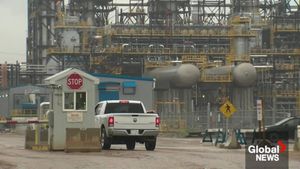Botswana's recent elections have become a focal point for analyzing the political shifts occurring across Africa. The landmark vote, which culminated the Botswana Democratic Party's (BDP) nearly six-decade hold on power, served as both a turning point and a cautionary tale for other nations grappling with similar dynamics.
The elections, heralded by some media outlets as a "political earthquake," witnessed the BDP being unseated by the Umbrella for Democratic Change (UDC) party, led by Dumo Boko. This transition was marked by the incumbent president, Mokgweetsi Masisi, displaying commendable transparency by conceding defeat and congratulating his opponent. This peaceful transfer of power is reflective of Botswana's strong democratic traditions and sets the stage for discussion on governance across the continent.
The factors contributing to the BDP's downfall are not unique to Botswana. Economic stagnation, rising unemployment, and pervasive public corruption ignited voter discontent, showcasing how societal issues can eclipse historical legacies of dominance. For many citizens, the promise of economic reform and development has taken precedence over nostalgia for past struggles. This trend mirrors the experiences of other liberation movements throughout Africa, particularly those grappling with citizen dissatisfaction amid rising expectations.
Across the border in Zimbabwe, where the recent election drew heavy international scrutiny, President Emmerson Mnangagwa faced substantial opposition after taking power following Robert Mugabe's ouster. His administration has been criticized for not meeting international election standards, and the public outcry reflects widespread frustration over governance failure. The Southern African Development Community (SADC) and other watchdogs flagged numerous irregularities during the elections, highlighting the struggles tied to governance and public trust within the region.
Interestingly, Mozambique's political climate offers additional contrasts. Following recent elections, the ruling party, Frelimo, retained power with Daniel Chapo at the helm, extending their governance to almost five decades. The results sparked protests and unrest, evidencing the pressure cooker of public discontent amid stagnated reforms. Citizens, having witnessed the failure of Frelimo to address systemic issues, are increasingly willing to voice their grievances, reminiscent of developments seen across various African states.
Further south, South Africa's African National Congress (ANC) is also grappling with voter disillusionment. The ANC's recent electoral performance, perceived as its worst since Nelson Mandela's iconic victory, has been attributed to what analysts call “arrogance” and growing disenchantment with corruption within the party. President Cyril Ramaphosa now leads a coalition government, illustrating the need to address rampant poverty and stark inequalities. Voter dissatisfaction reached levels where citizens voiced their frustration over neglected basic services, leading to the ANC’s diminishing support base.
A startling insight from The New York Times elaborates on the ANC’s plight, stating, "Black voters have grown resentful of the ANC government’s failure to provide even the most basic services." This paints a picture of widespread frustration, where citizens feel increasingly disconnected from the party they once trusted. The ANC's struggle signifies broader trends threatening once-dominant parties throughout Africa.
Interestingly, as Botswana's democratic processes take center stage, neighboring Namibia is preparing for its own electoral test. Scheduled for elections following the passing of its President Hage Geingob, the ruling South West Africa People's Organization (Swapo) is facing mounting pressure amid diminishing popularity. Once seen as the torchbearer for independence, Swapo's history of governance is now being questioned by younger voters, who are less inclined to resonate with its historical narrative.
Political analysts have drawn parallels between the decline of liberation movements like Swapo and other parties across the continent. The Africa Centre for Strategic Studies indicates this change is largely fueled by the emergence of restless youth, hungry for fresh ideologies and solutions to today’s pressing economic issues. Describing the shift, they highlighted the need for political entities to genuinely engage with their constituents.
Commentator Reuben Mbofana summed it up succinctly: “Former liberation movements should learn... using the 'we fought for this country's independence' argument only worked back then.” His commentary resonates with sentiment across the continent — citizens demand accountability and progressive policies over relics of historical conflicts. Addressing economic challenges remains the central focus for younger generations, who prioritize tangible improvements to their livelihoods over ideological dogmas.
The growing disconnect between traditional political parties and the electorate presents opportunities for new voices to emerge, reshaping the political landscapes of southern Africa. Fresh leadership unencumbered by historical baggage could rise to prominence as societies evolve toward progressive ideals focused on economic growth and development.
Looking at the broader picture, what's evident is the imperative for political movements to adapt to the changing attitudes of the electorate. The recent political upheavals and elections across southern Africa mark not just the end of old regimes, but potentially the beginning of new political narratives driven by the urgent needs of the populace. This moment can catalyze long overdue transformative changes, allowing for innovative approaches to governance, socio-economic growth, and national rejuvenation across the continent.



